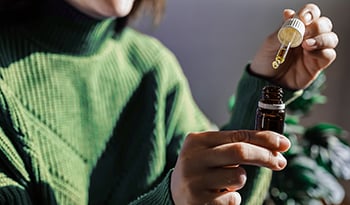Biotin: 3 Key Health Benefits, Dosage, Side Effects

Biotin is a member of the B vitamin family even though it can be produced by bacteria in the gut. It functions in the manufacture and utilization of fats and amino acids. A biotin deficiency in adults is characterized dry, scaly skin; nausea; anorexia; and seborrhea. In infants under six months of age, the symptoms are seborrheic dermatitis (cradle cap), persistent diaper rash, and alopecia (hair loss).
1. Biotin Benefits Strong Nails and Healthy Hair
Biotin is a popular recommendation to increase the strength of nails and promote healthy hair. Early research on biotin in this application came from the veterinary literature. Biotin was shown to increase the strength and hardness of hooves in pigs and horses. Human studies have shown that biotin supplementation (2,500 mcg per day) can produce a 25% increase in the thickness of the nail plate in patients diagnosed with brittle nails of unknown cause and up to 91% of patients taking this dosage will experience definite improvement. The beneficial effects of biotin on the health of hair possibly reflects an ability to improve the metabolism of scalp oils similar to its effects in seborrheic dermatitis.
2. Biotin Seborrheic Dermatitis Benefits
Seborrheic dermatitis is a common condition that may be associated with excessive oiliness (seborrhea) and dandruff. The scale of seborrhea may be yellowish and either dry or greasy. The scaly bumps may coalesce to form large plaques or patches. Seborrheic dermatitis usually occurs either in infancy (usually between two and twelve weeks of age) or in the middle-aged or elderly and has a prognosis of lifelong recurrence.
In infancy, seborrheic dermatitis is known as cradle cap. Several case histories have demonstrated successful treatment of cradle cap with biotin by either giving the mother the biotin if the baby is being breastfed or directly to the infant. Cases of persistent diaper rash have also responded as well.
In adults with seborrheic dermatitis, treatment with biotin alone is usually of no value, it probably requires all of these necessary B-vitamins.
3. Biotin Blood Sugar Benefits
Biotin supplementation has been shown to enhance insulin sensitivity and improve the utilization of blood sugar. This improvement is thought to be the result of an increase the activity of the enzyme glucokinase - an enzyme involved in the utilization of blood sugar by the liver. In one study, 8 mg of biotin twice daily day resulted in significant lowering of fasting blood sugar levels and improvements in blood glucose control in type I diabetics. Several studies have shown biotin alone and in combination with chromium can be helpful in improving blood sugar control and lower blood triglyceride levels in patients with type 2 diabetes. Similar effects were noted with 9 mg of biotin per day. High dose biotin has also been reported to be very helpful in the treatment of severe diabetic nerve disease (diabetic neuropathy).
Usual Dosage:
The estimated safe and adequate dietary intake for adults is 30-100 mcg. To promote stronger nails and healthy hair a typical dosage range is 1,000 to 3,000 mcg per day. In the treatment of seborrheic dermatitis, the dosage to administer to nursing mothers is 3,000 mcg twice daily. For infants not being breastfed, an effective dosage is estimated to be 100-300 mcg daily. In the treatment of diabetes and diabetic neuropathy, dosages of 4 to 8 mg twice daily can be used.
Possible Side Effects:
Biotin is extremely safe and no side effects have been reported with biotin supplementation.
Interactions:
Antibiotics may decrease biotin levels due to the destruction of biotin-producing bacteria in the intestines. Biotin works synergistically with other B-vitamins as well as coenzyme Q10 and carnitine. Alcohol inhibits the absorption and utilization of biotin.
Cautions and Warnings:
Individuals with diabetes should use caution when using high doses (e.g., greater than 4 mg) as it may produce reductions in blood sugar levels requiring changes in the dosage of insulin or other medications.
High doses of biotin (e.g., greater than 3,000 mcg) can also interfere with certain laboratory tests. In some cases, it causes falsely high results on tests while in others, it causes the results to read as falsely low. If you are taking high doses of biotin, please let your physician know so it can be taken into consideration.
DISCLAIMER:This Wellness Hub does not intend to provide diagnosis...
















































































 Table of Contents
Table of Contents
















